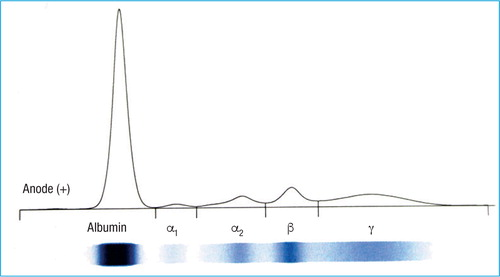Serum and urine electrophoresis are laboratory techniques used to separate proteins based on their size and charge. These methods can provide important information about different protein components in the body, which can be helpful in diagnosing and monitoring various diseases and conditions.
Serum Protein Electrophoresis (SPEP): SPEP is a test that separates proteins found in the blood serum. Blood serum contains a variety of proteins, including albumin, alpha-1, alpha-2, beta, and gamma globulins. During the test, an electric current is applied to a serum sample placed on a special gel. Because proteins are charged molecules, they move through the gel at different rates depending on their size and charge, creating distinct bands that can be visualized and quantified.
Abnormal SPEP patterns can indicate several conditions:
- A tall, narrow peak in the gamma region might suggest a monoclonal gammopathy, which is characteristic of multiple myeloma or related conditions.
- Broad increases in gamma globulins can indicate chronic inflammation or chronic infection.
- Decreased albumin levels might suggest liver or kidney disease.
Urine Protein Electrophoresis (UPEP): UPEP is similar to SPEP but is used to analyze proteins in the urine. Normally, very little protein is present in the urine, but certain diseases can increase protein levels. UPEP can detect and identify monoclonal proteins (Bence Jones proteins) in the urine, which are often associated with conditions like multiple myeloma or Waldenström’s macroglobulinemia.
Both SPEP and UPEP are often performed alongside an immunofixation electrophoresis (IFE), which can further characterize the types of proteins or immunoglobulins present, especially when identifying a specific monoclonal protein is necessary for the diagnosis of diseases like multiple myeloma.
The results of electrophoresis must be interpreted in the context of a patient’s clinical presentation and other laboratory findings. These tests are valuable tools for clinicians in the diagnosis and monitoring of blood disorders, immune disorders, and kidney dysfunction.

